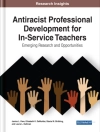This book brings together recent research on interpersonal relationships in education from a variety of perspectives including research from Europe, North America and Australia. The work clearly demonstrates that positive teacher-student relationships can contribute to student learning in classrooms of various types. Productive learning environments are characterized by supportive and warm interactions throughout the class: teacher-student and student-student. Similarly, at the school level, teacher learning thrives when there are positive and mentoring interrelationships among professional colleagues. Work on this book began with a series of formative presentations at the second International Conference on Interpersonal Relationships in Education (ICIRE 2012) held in Vancouver, Canada, an event that included among others, keynote addresses by David Berliner, Andrew Martin and Mieke Brekelmans. Further collaboration and peer review by the editorial team resulted in the collection of original research that this book comprises. The volume (while eclectic) demonstrates how constructive learning environment relationships can be developed and sustained in a variety of settings. Chapter contributions come from a range of fields including educational and social psychology, teacher and school effectiveness research, communication and language studies, and a variety of related fields. Together, they cover the important influence of the relationships of teachers with individual students, relationships among peers, and the relationships between teachers and their professional colleagues.
สารบัญ
Foreword: Theory and Practice in Interpersonal Relationships in Education; 1. The Theory and Practice of Interpersonal Relationships in Education; 2. Interpersonal Relationships and Students’ Academic and Non-academic Development: What Outcomes Peers, Parents, and Teachers Do and Do Not Impact; 3. Problem Behaviour and the Development of the Teacher-child Relationship in Special Education; 4. Enhancing the Interpersonal Relationships in Teacher Education through the Development and Practice of Reflective Mentoring; 5. Navigating Middle Ground: A Spatial Perspective on the Borderlands of Teacher-student Relationships in Secondary School; 6. I Felt Safe to Be a Child, I Wanted to Learn: Locating Caring Respectful Relationships as Core Components in Enabling Learning Accessibility; 7. The Role of Role-taking: Social Perspective Taking and Interpersonal Relationships in Virtual Simulations; 8. The Role of Emotions and Interpersonal Relationships in Educational Reform: A Behaviour Management Case Study; 9. Do Teacher-student Interpersonal Relationships Deteriorate over Time? An Investigation of Within-year Changes and Links with Autonomous Motivation in Indonesia; 10. Social Forces in School Teams: How Demographic Composition Affects Social Relationships; 11. Learning Environment Experiences in Primary Education: Their Importance to Academic Engagement; 12. Learning Environments in Higher Education: A Study of Environmental Education Programming in Teacher Education; 13. My Friends Made Me Do It: How Teens’ Social Identity Influences Educational Outcomes; 14. Stimulating Autonomous Motivation in the Classroom: The Role of Interpersonal Teacher Agency and Communion.












